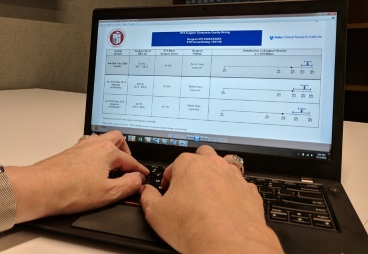STS News, Spring 2019 — The Society is offering a new opportunity for self-assessment and quality improvement in cardiothoracic surgery—surgeon-specific outcomes reports from the Adult Cardiac Surgery Database (ACSD). For those who opt in, these reports will be available beginning in fall 2019 and will include data on coronary artery bypass grafting (CABG), aortic valve replacement (AVR), CABG+AVR, mitral valve repair and replacement (MVRR), and CABG+MVRR.
“We spent several years developing the methodologies that will most accurately reflect surgeon performance,” explained David M. Shahian, MD, Chair of the STS Task Force on Quality Measurement who has been involved with the STS National Database since its launch in 1989 and most recently chaired the STS Council on Quality, Research, and Patient Safety. “The composite measure is very complex and includes outcomes data from five surgical procedures over a 3-year period, both risk-adjusted mortality and risk-adjusted morbidity. Because of the multiple procedures, multiple endpoints, and multiple years of data, the reliability of this measure is actually the highest we’ve ever had. We feel very comfortable that it is a good reflection of surgeon performance.”
To avoid confusion with the hospital or group-level reports, the surgeon-specific feedback reports will not use the term “star ratings”; instead, overall performance will be categorized descriptively—as expected for the participating surgeon’s case mix during the relevant time period, better than expected for the surgeon’s case mix during the relevant time period, or worse than expected for the surgeon’s case mix during the relevant time period.

This voluntary surgeon-specific feedback represents a natural evolution of the Database as a tool to help surgeons assess and analyze how they work.
“The roles of the intensivist, hospitalist, and other consultants have become more important within the care delivery module,” said Alan M. Speir, MD, Chair of the STS Council on Health Policy and Relationships. “But, at the end of the day, the surgeon is still primarily involved in the direction of patient care. This is reflected in the composite [score], and these reports will give us a better understanding of how we are performing at an individual level.”
Those surgeons participating in the ACSD who want their feedback will need to affirmatively opt in by submitting an election form, which is available at sts.org/surgeonspecific. The first report will reflect outcomes data from January 2016 through December 2018.
"The reliability of this measure is actually the highest we’ve ever had. We feel very comfortable that it is a good reflection of surgeon performance."
Many surgeons are expected to take advantage of this new service. A recent survey found that a clear majority of surgeons participating in the ACSD (88%) thought it would be valuable for them to have an accurate measure of their own personal performance on a core set of procedures.
“The results were striking,” said Dr. Shahian. “I thought most surgeons would want to see these data, but often it takes a while for a new program to gain acceptance. To their credit, the members of our community want to have credible, reliable estimates of their performance, especially since there are so many inaccurate measures of physician performance on the web and elsewhere.”
STS Past President Richard L. Prager, MD, who participates in a statewide quality collaborative, said that he also was pleasantly surprised by the survey results. "Socialization of data is the norm in states like Michigan and Virginia. Within our quality collaborative in Michigan, surgeons are accustomed to seeing data and all wished for their individual composite feedback reports; while I was hopeful, I was not certain that would be the case elsewhere and I am very pleased.”
Before members of the STS Board of Directors decided to make surgeon-specific feedback reports available on an opt-in basis, they discussed this topic at length during two successive meetings. It was extremely important to surgeon leaders that the initiative be used to further the interests of surgeon self-assessment and quality improvement—not for marketing or other publication. Consequently, and as a matter of STS policy enforceable under the Society’s existing disciplinary procedures, the surgeon-specific feedback is not for public or other external release. It is important to note, however, that because many surgeons participate in the ACSD jointly with their hospitals and are both signatories to the contract, some hospitals may seek the reports. As a result, STS cannot guarantee that surgeon-level reports will not be accessed by hospital administrators.
“At the end of the day, this initiative is about finding ways to deliver better care for our patients. Surgeons should be empowered to not only isolate areas that need improvement, but also—and more importantly—identify best practices to drive greater improvement,” added STS International Director Domenico Pagano, MD. “We can only do that through objective feedback.”
Although these new surgeon-specific feedback reports will be available on a periodic basis, both Drs. Shahian and Prager said that it is their hope the reports would one day be available on a continuous basis in real time with much more granular feedback.
Drs. Shahian, Speir, Prager, and Pagano participated in a recent roundtable discussion about surgeon-specific feedback. The video of this discussion is available on the Society’s YouTube Channel at sts.org/surgeonspecificvideo; the audio is available as an STS Surgical Hot Topics podcast at sts.org/surgeonspecificpodcast.
If you have questions or comments about the surgeon-specific feedback initiative, please email surgeonspecific@sts.org.